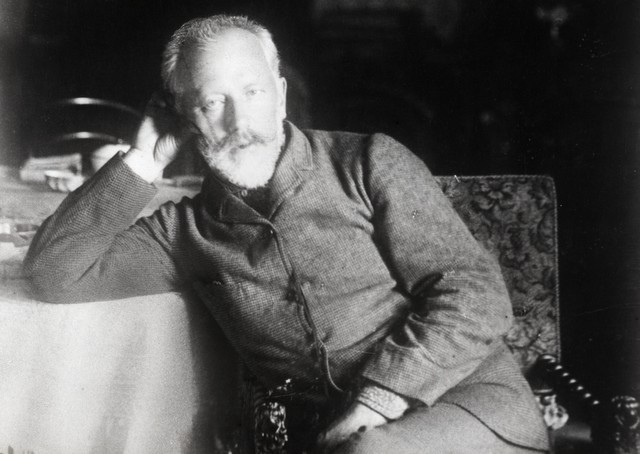Pyotr Ilyich Tchaikovsky: ‘Beethoven has also made me tremble. But rather from something like fear and the pangs of suffering.’Pleasures of Music
My Taste In Classics
By P.I. Tchaikovsky
Probably after my death it will not be uninteresting to know what were my musical predilections and prejudices, especially since I seldom gave opinions in verbal conversation.
Shall start gradually and shall speak to the point, touching upon musicians living at the same time with me and about their personalities.
Shall start with Beethoven, whom it is usual to praise unconditionally and whom it is commanded to worship as though he were a god. And so what is Beethoven to me?
I bow before the greatness of some of his works—but I do not love Beethoven. My attitude toward him reminds me of what I experienced in childhood toward the God Jehovah. I had toward Him (and even now my feelings have not changed) a feeling of wonder, but at the same time also of fear. He created Heaven and earth, He too created me—and still even though I bow before him, there is no love. Christ, on the contrary, inspires truly and exclusively the feeling of love. Though he was God, He was at the same time man. He suffered like us. We pity Him, we love in Him His ideal human side. And if Beethoven occupies a place in my heart analogous to the God Jehovah, then Mozart I love as the musical Christ. Incidentally, he lived almost as long as Christ. I think that there is nothing sacrilegious in this comparison. Mozart was a being so angelic, so childlike, so pure; his music is so full of unapproachable, divine beauty, that if anyone could be named with Christ, then it is he.
Speaking of Beethoven, I come to Mozart. According to my deep conviction, Mozart is the highest, the culminating point that beauty has attained in the sphere of music. No one has made me weep, has made me tremble with rapture, from the consciousness of my nearness to that something which we call the ideal, as he has done.
Beethoven has also made me tremble. But rather from something like fear and the pangs of suffering.
‘Mozart,’ Tchaikovsky wrote, ‘is the highest, the culminating point that beauty has attained in the sphere of music.’ Here, Renee Fleming and Dmitri Hvorostovsky perform the beloved duet ‘Là ci darem la mano’ from ‘Don Giovanni,’ the most famous telling of the Don Juan story that was the second of the three great operas Mozart wrote in collaboration with librettist Lorenzo da Ponte. Its premiere was at the Prague Opera in 1787. Set in the 17th century, the opera, which was subtitled ‘dramma giocoso,’ meaning ‘playful drama,’ masterfully combines uproarious comedy with moments of genuine tragedy.I cannot discourse on music and shall not go into details. However, I shall mention two details: (1) In Beethoven I love the middle period, at times the first, but I fundamentally detest the last, especially the last quartets. Here there are glimmers—and nothing more. The rest is chaos, over which, surrounded by an impenetrable fog, hovers the spirit of this musical Jehovah. (2) In Mozart I love everything, for we love everything in a person whom we love truly. Above all Don Juan, for thanks to it I learned what music is. Until that time (until my seventeenth year) I did not know any music except Italian, semi-music, however charming. Of course, loving everything in Mozart, I shall not start asserting that every insignificant work of his is a chef-d’oeuvre. Yes! I know that none of his sonatas, for example, is a great work, and still I love every one of his sonatas because it is his, because this musical Christ imprinted it with his serene touch.
From Act 2 of Tchaikovsky’s Swan Lake, the Pas de Quatre Small Swans as danced by the Bolshoi BalletConcerning the forerunners of both, can I say that I play Bach gladly, for to play a good fugue is entertaining, but I do not recognize in him (as some do) a great genius. Handel has for me an entirely fourth-rate significance and he is not even entertaining. Gluck, despite the relative poverty of his creation, is attractive to me. I like certain things of Haydn. But all these four Muses are amalgamated in Mozart. He who knows Mozart also knows what is good in these four, because being the greatest and most potent of all musical creators, he was not averse, even, to taking them under his wings and saving them from oblivion. They are rays lost in the sun of Mozart.
DIARIES (1886)
THE BLUEGRASS SPECIAL
Founder/Publisher/Editor: David McGee
Contributing Editors: Billy Altman, Laura Fissinger, Christopher Hill, Derk Richardson
Logo Design: John Mendelsohn (www.johnmendelsohn.com)
Website Design: Kieran McGee (www.kieranmcgee.com)
Staff Photographers: Audrey Harrod (Louisville, KY; www.flickr.com/audreyharrod), Alicia Zappier (New York)
E-mail: thebluegrassspecial@gmail.com
Mailing Address: David McGee, 201 W. 85 St.—5B, New York, NY 10024
Founder/Publisher/Editor: David McGee
Contributing Editors: Billy Altman, Laura Fissinger, Christopher Hill, Derk Richardson
Logo Design: John Mendelsohn (www.johnmendelsohn.com)
Website Design: Kieran McGee (www.kieranmcgee.com)
Staff Photographers: Audrey Harrod (Louisville, KY; www.flickr.com/audreyharrod), Alicia Zappier (New York)
E-mail: thebluegrassspecial@gmail.com
Mailing Address: David McGee, 201 W. 85 St.—5B, New York, NY 10024


